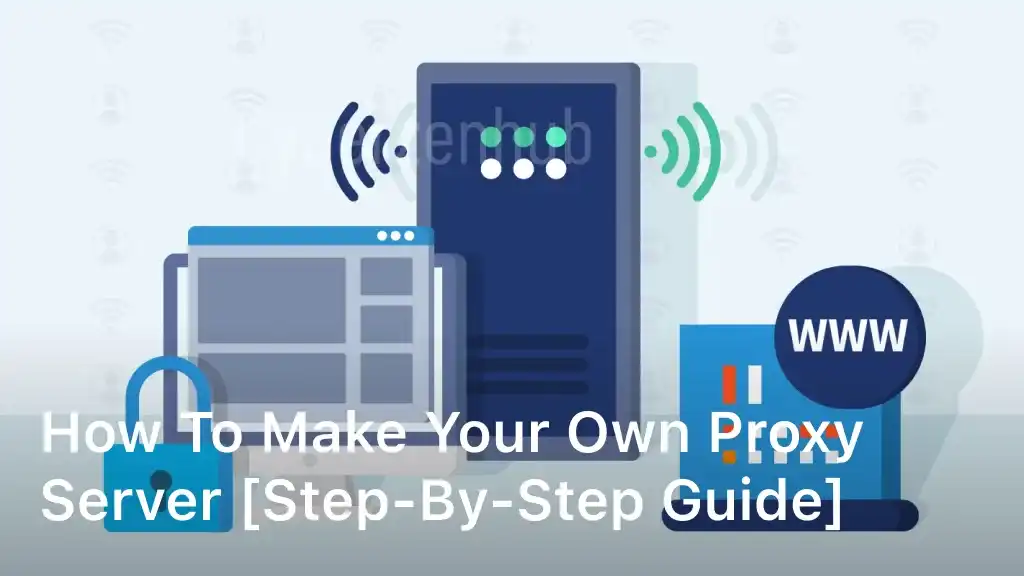Welcome to our comprehensive guide on how to make your own proxy server. If you’re looking to enhance your online privacy and security, setting up your own proxy server is a fantastic option. In this step-by-step guide, we’ll walk you through the entire process, ensuring you can create a personalized proxy server tailored to your needs. By following our detailed instructions, you’ll learn how to create a secure connection that safeguards your online activities. Whether you’re a beginner or have some technical experience, our guide is designed to be accessible for all skill levels. But first, let’s start with the basics. In the next section, we’ll provide an overview of proxy servers, their purpose, and how they play a crucial role in protecting your online presence. Understanding these fundamental concepts will lay a strong foundation for the subsequent steps. Are you ready to take control of your online privacy? Let’s delve into the world of proxy servers and start building your own! Understanding Proxy Servers Before you start setting up your own proxy server, it’s crucial to have a clear understanding of what a proxy server is and how it works. In this section, we will dive into the basics of proxy servers, their functionalities, and the role they play in safeguarding your online activities. What is a Proxy Server? A proxy server acts as an intermediary between your device and the internet. When you access a website or any online resource, your request is first sent to the proxy server, which then forwards it to the destination server on your behalf. This way, your original IP address and other identifying information are masked, providing you with increased privacy and anonymity. The Functions of a Proxy Server Proxy servers offer various functionalities that can enhance your online experience. Here are some key functions: Anonymity: Proxy servers hide your real IP address, making it difficult for websites to track your online activities. This is especially useful if you want to maintain privacy and protect yourself from potential threats. Access Control: Some proxy servers allow you to restrict access to certain websites or block undesirable content. This can be particularly useful for organizations that want to control internet access for their employees. Content Caching: Proxy servers can store frequently accessed content locally, reducing the load on the network and speeding up access times. Bandwidth Optimization: By caching content and compressing data, proxy servers can help optimize bandwidth usage and improve overall network performance. Content Filtering: Proxy servers can filter out malicious or inappropriate content, providing an additional layer of security for users. Understanding these functions will help you make informed decisions when setting up your own proxy server based on your specific needs and requirements. Choosing the Right Server Software When it comes to building your personalized proxy server, selecting the right server software is of utmost importance. Luckily, there are numerous options available that can cater to your specific needs. In this section, we will explore different software options and provide recommendations to help you make an informed decision. Considerations for Choosing Server Software Compatibility: Ensure that the server software you choose is compatible with your operating system and hardware. Performance and Scalability: Evaluate the software’s performance capabilities and its ability to handle concurrent connections. Features and Customization: Look for server software that offers a wide range of features and allows for customization to meet your unique requirements. Security: Prioritize server software that includes robust security measures to protect your proxy server and the data flowing through it. Community and Support: Consider the availability of a supportive community and reliable technical support for the server software you select. Popular Server Software Options Here are some popular server software options that are commonly used for homemade proxy server configuration: Squid: Squid is a widely used and powerful proxy server software known for its impressive performance and extensive features. It supports various protocols and provides advanced caching capabilities. Privoxy: Privoxy is an open-source proxy server software that focuses on privacy and filtering capabilities. It offers flexible configuration options and can be easily customized to suit your needs. Shadowsocks: Shadowsocks is a secure proxy server software that allows for easy bypassing of censorship and offers high encryption to protect your online activities. It is particularly popular in regions with strict internet regulations. These are just a few examples, and there are many other server software options available. Make sure to thoroughly research each option and choose the one that aligns best with your requirements for a homemade proxy server configuration. Installing and Configuring the Proxy Server Software Now that you have selected the appropriate server software, it’s time to take the next step in creating your personalized proxy server. In this section, we will guide you through the installation process and help you configure the settings to set up your self-hosted proxy server. Follow these step-by-step instructions to create your proxy server: Download the proxy server software from the official website or trusted sources. Run the installation file and follow the on-screen prompts to install the software on your server. Once the installation is complete, launch the proxy server software. Configure the basic settings, such as the server name, port number, and authentication method. Customize advanced settings, such as access control, logging, and encryption options, to enhance the security and functionality of your proxy server. Verify that the proxy server is running correctly by testing its connectivity and functionality. By following these steps, you will successfully install and configure your proxy server software, enabling you to have full control over your online browsing experience. Next, we will delve into the important security measures you need to consider to safeguard your self-hosted proxy server. Establishing Security Measures When it comes to setting up a proxy server, prioritizing security is of utmost importance. By implementing the right security measures, you can ensure that your custom proxy server is adequately protected against potential threats and vulnerabilities. 1. Access Control One of the key security measures to consider is access control. This involves controlling who





